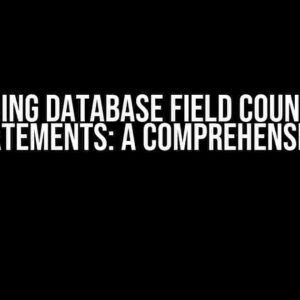When it comes to coding in C++, one of the most common mistakes that developers make is forgetting to include the header file that initializes static variables. This can lead to a world of trouble, including undefined behavior, unexpected results, and a whole lot of frustration. But fear not, dear coder, for we’re about to dive into the solution to this problem and uncover the secrets of ensuring initialization of static variables without explicitly including the header file.
What’s the Problem with Static Variables?
Before we dive into the solution, let’s take a step back and understand the problem. Static variables are variables that are initialized only once, when the program starts, and retain their value throughout the execution of the program. Sounds great, right? Well, not quite. The issue arises when you try to use a static variable in a header file without including the header file that defines it. This can lead to undefined behavior, because the variable is not properly initialized.
For example, let’s say you have a header file called `myheader.h` that contains a static variable `myStaticVar`:
#ifndef MYHEADER_H
#define MYHEADER_H
static int myStaticVar = 0;
#endif // MYHEADER_HIf you then include this header file in multiple source files, but don’t include the header file that defines `myStaticVar`, you’ll get undefined behavior. This is because the variable is not properly initialized, and each source file will have its own copy of the variable.
The Solution: Using an Inline Function
So, how do we ensure that static variables are properly initialized without explicitly including the header file? The answer lies in using an inline function. An inline function is a function that is expanded in line at the point of call, rather than being called as a separate function. This allows us to define the static variable inside the inline function, ensuring that it’s properly initialized every time it’s used.
Here’s an example of how you can use an inline function to initialize a static variable:
inline int& getMyStaticVar() {
static int myStaticVar = 0;
return myStaticVar;
}In this example, the `getMyStaticVar` function returns a reference to the static variable `myStaticVar`. The variable is defined inside the function, so it’s properly initialized every time the function is called.
Now, let’s say you want to use `myStaticVar` in multiple source files. You can simply call the `getMyStaticVar` function to get a reference to the variable, without having to include the header file that defines it:
int main() {
int& myVar = getMyStaticVar();
// Use myVar here
return 0;
}Benefits of Using Inline Functions
Using inline functions to initialize static variables has several benefits, including:
- Ensures proper initialization**: By defining the static variable inside the inline function, you can ensure that it’s properly initialized every time it’s used.
- Avoids header file inclusion**: You don’t need to include the header file that defines the static variable, which can help reduce compilation time and avoid circular dependencies.
- Reduces code duplication**: By defining the inline function once, you can use it in multiple source files without having to duplicate code.
- Improves code readability**: Using an inline function to initialize a static variable can make your code more readable and easier to understand.
Common Pitfalls to Avoid
While using inline functions to initialize static variables is a great solution, there are some common pitfalls to avoid:
- Don’t define the static variable outside the inline function**: If you define the static variable outside the inline function, it will not be properly initialized.
- Avoid using static variables in inline functions with static linkage**: If you use a static variable with static linkage in an inline function, it will not be properly initialized.
- Don’t use inline functions with variables that require dynamic initialization**: If you use an inline function to initialize a variable that requires dynamic initialization, it will not work as expected.
Best Practices for Using Inline Functions
To get the most out of using inline functions to initialize static variables, follow these best practices:
- Use inline functions sparingly**: Only use inline functions when necessary, as they can make your code harder to read and debug.
- Keep inline functions short and simple**: Keep your inline functions short and simple, as complex functions can be harder to read and maintain.
- Use meaningful names for inline functions**: Use meaningful names for your inline functions, so that they’re easy to understand and use.
- Document inline functions**: Document your inline functions, so that other developers can understand how to use them.
Conclusion
In conclusion, using inline functions is a great way to ensure initialization of static variables without explicitly including the header file. By following the best practices outlined above, you can make your code more readable, maintainable, and efficient. So, the next time you’re working with static variables, remember to reach for an inline function!
| Header File | Static Variable | Inline Function |
|---|---|---|
| myheader.h | myStaticVar | getMyStaticVar() |
Remember, with great power comes great responsibility. Use inline functions wisely, and always keep in mind the benefits and pitfalls of using them.
Frequently Asked Questions
- Q: Can I use inline functions with non-static variables?
A: No, inline functions are typically used with static variables to ensure proper initialization.
- Q: Can I define an inline function in a header file?
A: Yes, you can define an inline function in a header file, but be careful to avoid multiple definitions.
- Q: How do I use an inline function with a static variable that requires dynamic initialization?
A: You can’t use an inline function with a static variable that requires dynamic initialization. Instead, use a regular function or a constructor.
We hope this article has helped you understand how to ensure initialization of static variables without explicitly including the header file. Happy coding!
Frequently Asked Question
In the world of programming, ensuring the proper initialization of static variables can be a daunting task, especially when you don’t want to explicitly include the header file. But fear not, dear developer, for we’ve got the answers to your burning questions!
Q1: How can I ensure the initialization of static variables without including the header file?
One way to ensure initialization is by defining the static variables in a separate source file, rather than in the header file. This way, the variables are initialized only once, when the source file is compiled.
Q2: What if I have multiple source files that use the same static variables? Won’t they be reinitialized every time?
Nope! If you define the static variables in a single source file, and then use them in multiple files, they will only be initialized once. The linker will take care of resolving the external references, so you don’t have to worry about reinitialization.
Q3: What about static variables with constructors? Will they be initialized correctly?
Yes, static variables with constructors will be initialized correctly, as long as you define them in a single source file. The constructor will be called only once, when the static variable is initialized.
Q4: Can I use inline functions to initialize static variables?
Yes, you can use inline functions to initialize static variables. However, keep in mind that inline functions can lead to multiple definitions, so be careful with your compiler settings and use the `inline` keyword wisely.
Q5: Are there any compiler-specific solutions to ensure static variable initialization?
Yes, some compilers, like GCC, provide extensions to ensure static variable initialization, such as the `__attribute__((constructor))` attribute. However, these solutions are compiler-specific, so be sure to check your compiler’s documentation for more information.


